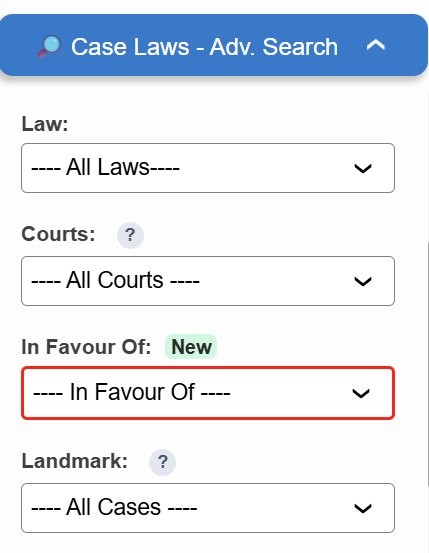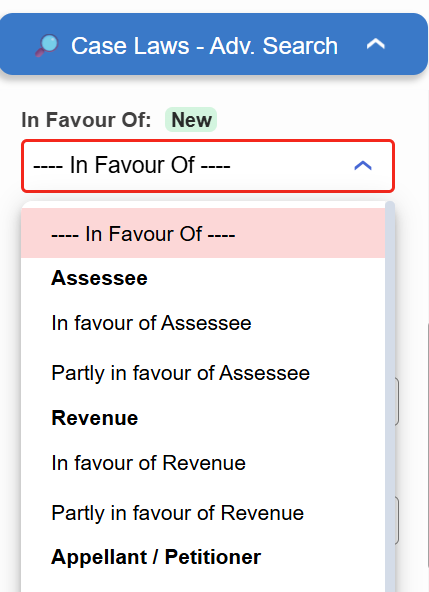Introducing the “In Favour Of” filter in Case Laws.
- ⚖️ Instantly identify judgments decided in favour of the Assessee, Revenue, or Appellant
- 🔍 Narrow down results with higher precision
Try it now in Case Laws →


Just a moment...
Introducing the “In Favour Of” filter in Case Laws.
Try it now in Case Laws →


Press 'Enter' to add multiple search terms. Rules for Better Search
No Folders have been created
Are you sure you want to delete "My most important" ?
NOTE:
Don't have an account? Register Here
<h1>Section 263 cannot be invoked where AO properly verified Form 26AS and allowed TDS refund; revision set aside</h1> ITAT (Visakhapatnam) held that the assessee lawfully claimed a TDS refund after verification of Form 26AS and that the AO had examined and allowed the TDS ... Revision u/s 263 - Refund claim - as argued refund was issued after due verification of TDS records in Form 26AS, which reflected a TDS credit - HELD THAT:- We found that the assessee has merely claimed a refund of TDS, which is a statutory right and directly linked to the income assessed in the return filed in response to notice u/s.148. AO has examined the TDS credit and refund claim before allowing it. PCIT has not demonstrated any error in this regard. The provisions of section 263 can be invoked only if the order of Ld. AO is erroneous and it is prejudicial to the interest of revenue. Accordingly, we are of the opinion that there is no error in the order passed by the Ld. AO which is prejudicial to the interest of revenue. Therefore, the invocation of revisionary jurisdiction u/s. 263 of the Act by Ld. PCIT is without any jurisdiction and unsustainable. Accordingly, we set aside the order of Ld. PCIT u/s. 263. Appeal filed by the assessee is allowed. ISSUES PRESENTED AND CONSIDERED 1. Whether a taxpayer who files a return of income in response to a notice under section 148 (reassessment notice) - having not filed a return under section 139(1) - is entitled to claim refund of excess tax/TDS under sections 199 and 237 when the assessing officer, on reassessment under section 147 r.w.s.144B, accepts the return and assesses income as nil. 2. Whether the Principal Commissioner/Comptroller (revisionary authority) can invoke section 263 to set aside the assessing officer's order granting such a refund on the ground that reassessment proceedings under section 147 cannot be used to confer benefits to the assessee (i.e., whether the AO's order was 'erroneous' and 'prejudicial to the public revenue' within the scope of section 263). 3. Proper interpretation and application of the principle that reassessment proceedings are limited to escaped income (and cannot be employed to grant fresh deductions or exemptions) vis-à-vis a claim of TDS credit/refund that is directly linked to the income assessed in the return filed during reassessment. ISSUE-WISE DETAILED ANALYSIS Issue 1 - Entitlement to refund of TDS claimed in return filed in response to section 148 notice Legal framework: Sections 139(1), 147, 148 and 144B govern filing of returns, reopening and reassessment; sections 199 and 237 deal with TDS credit and refund of tax paid in excess. Section 237 expressly entitles a person to refund where tax paid exceeds the amount properly chargeable. Precedent treatment: Higher court decisions have recognized that a claim for refund of excess tax/TDS is a statutory right under the relevant provisions and that acceptance of the return by the AO in reassessment can give effect to such rights. Coordinate bench decisions have likewise allowed refunds where the AO, after examining the return filed in response to a section 148 notice, assessed income as nil and permitted refund of excess TDS. Interpretation and reasoning: When an assessing officer, in the course of proceedings under section 147 r.w.s.144B, examines a return filed in response to a section 148 notice and accepts the income declared therein (including assessing income as nil), the statutory entitlement to TDS credit and refund under sections 199 and 237 follows from the assessed position. Section 237 contains no pre-condition that the return must have been originally filed under section 139(1) or that some positive tax liability must be found before refund can be claimed; it requires only that tax has been paid in excess of the amount properly chargeable for the year. A refund claim that is directly linked to the income accepted by the AO in reassessment is not a 'fresh' deduction or exemption but recognition of tax already paid in excess of assessed liability. Ratio vs. Obiter: The ratio is that acceptance by the AO of the return filed in response to a section 148 notice, resulting in assessment of nil income, establishes the entitlement to refund of excess tax/TDS under section 237. Any remarks distinguishing this position from cases concerning fresh deductions unrelated to escaped income are explanatory (obiter) in nature. Conclusion: A taxpayer who files a return in response to a section 148 notice and whose declared nil income is accepted by the AO in reassessment is entitled to claim refund of excess TDS under sections 199 and 237; the fact that no return had been filed originally under section 139(1) does not, by itself, defeat the statutory refund right when the reassessment accepts the return. Issue 2 - Validity of invoking section 263 to set aside AO's grant of refund Legal framework: Section 263 empowers the Commissioner to revise an assessment only where the order of the AO is both erroneous and prejudicial to the interests of revenue. Both conditions are necessary; mere possibility of error or mere prejudice is insufficient without demonstration of both components. Precedent treatment: Controlling authority establishes the twofold test for exercise of revisional jurisdiction under section 263 - error plus prejudice to revenue. Decisions denying exercise of section 263 where the AO properly considered material and reached a defensible conclusion on statutory entitlement have been followed by coordinate authorities that set aside revisionary action lacking demonstration of error prejudicial to revenue. Interpretation and reasoning: The revisionary authority must point to a concrete error in the AO's order and show how that error prejudices the revenue. Where the AO has examined the TDS credits, considered the return filed under section 148, and accepted the income as nil before granting refund, the Commissioner must demonstrate a specific misapprehension of law or fact that led to an erroneous result prejudicial to revenue. Reliance on the general proposition that reassessment cannot be used to claim benefits is insufficient absent a showing that the refund constituted a fresh deduction unrelated to assessed income or that the AO failed to examine material necessary to the correctness of the refund. In the present context, the AO had examined the TDS credit and refund claim; no specific error was identified by the Commissioner that rendered the AO's order erroneous and prejudicial within the meaning of section 263. Ratio vs. Obiter: The ratio is that invocation of section 263 to overturn an AO's grant of refund is impermissible where the AO has examined and accepted the return filed under section 148 and there is no demonstrated error prejudicial to revenue. Observations treating reassessment's limitations as a blanket bar to refunds are explanatory only and do not supplant the twofold test for section 263. Conclusion: The Commissioner's exercise of revisional jurisdiction under section 263 to direct withdrawal of the refund was unsustainable because neither error in the AO's reasoning nor prejudice to revenue was demonstrated; accordingly revisionary action was without jurisdiction and liable to be set aside. Issue 3 - Application of the principle that reassessment is limited to escaped income vs. refund claims linked to assessed income Legal framework: Reassessment under section 147/148 is principally intended to address escaped income; jurisprudence cautions against using reassessment as a vehicle to introduce unrelated fresh deductions or exemptions. However, statutory entitlements arising from tax credits (e.g., TDS) tied to the assessed position must be considered in the assessment exercise. Precedent treatment: Authorities distinguishing claims that constitute new deductions (not connected to escaped income) from claims that are simply recognition of tax already paid and linked to the assessed income have been followed. Courts have denied use of reassessment to claim unrelated deductions but have permitted refunds of TDS where the assessed position supports such refunds. Interpretation and reasoning: The key distinction is functional: a 'fresh' deduction/exemption changes the tax computation by introducing new relief unrelated to the reassessment's subject-matter, whereas a TDS credit/refund is an acknowledgement that tax was deducted/paid in excess relative to the assessed liability. When the AO's reassessment establishes the taxable position (e.g., nil income), the statutory mechanism for credit/refund operates in continuity with that assessed position; allowing refund in such circumstances does not convert reassessment into a vehicle for unrelated benefits but gives effect to statutory rights attendant on the assessed outcome. Ratio vs. Obiter: The holding that reassessment cannot be used to claim unrelated deductions remains ratio in appropriate cases; simultaneously, the holding that TDS refunds directly linked to assessed income may be allowed during reassessment is a binding conclusion in the facts where the AO has accepted the return and examined TDS credits. Conclusion: The principle limiting reassessment to escaped income does not preclude allowance of a refund of TDS that is directly linked to the income accepted in reassessment; such refund is not a fresh deduction but a statutory credit/refund consequent to the assessed position and must be permitted when the AO legitimately allows it. Overall Disposition The assessing officer's allowance of refund pursuant to a return filed in response to a section 148 notice - after examination of TDS credits and assessment of income as nil - was not shown to be erroneous or prejudicial to revenue; the revisionary order under section 263 setting aside that allowance was unsustainable and was therefore set aside. The appeal by the taxpayer was allowed.